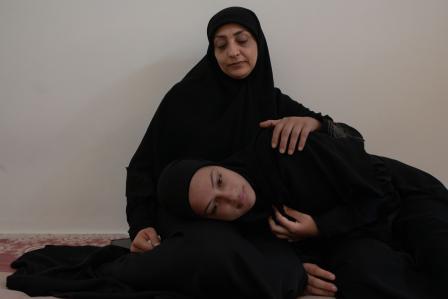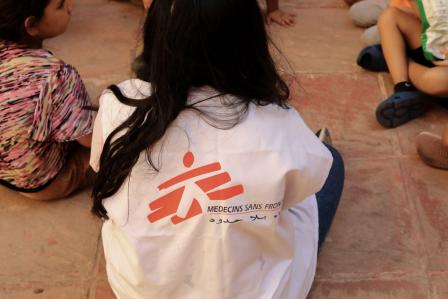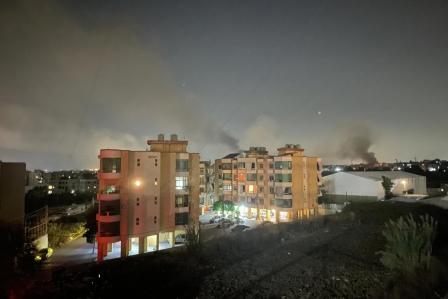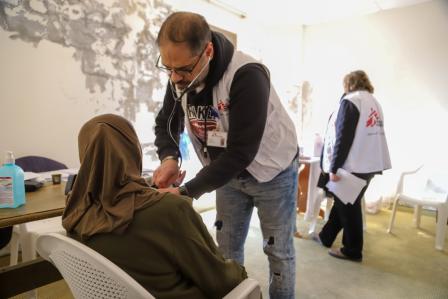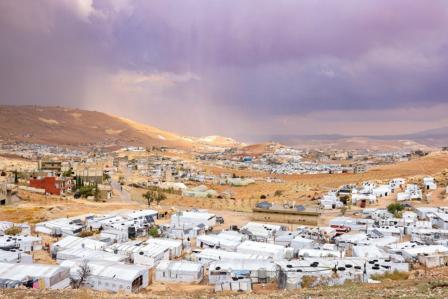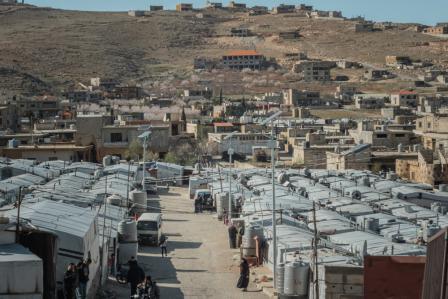Trapped in fear: Syrian refugees face unbearable choices in Lebanon
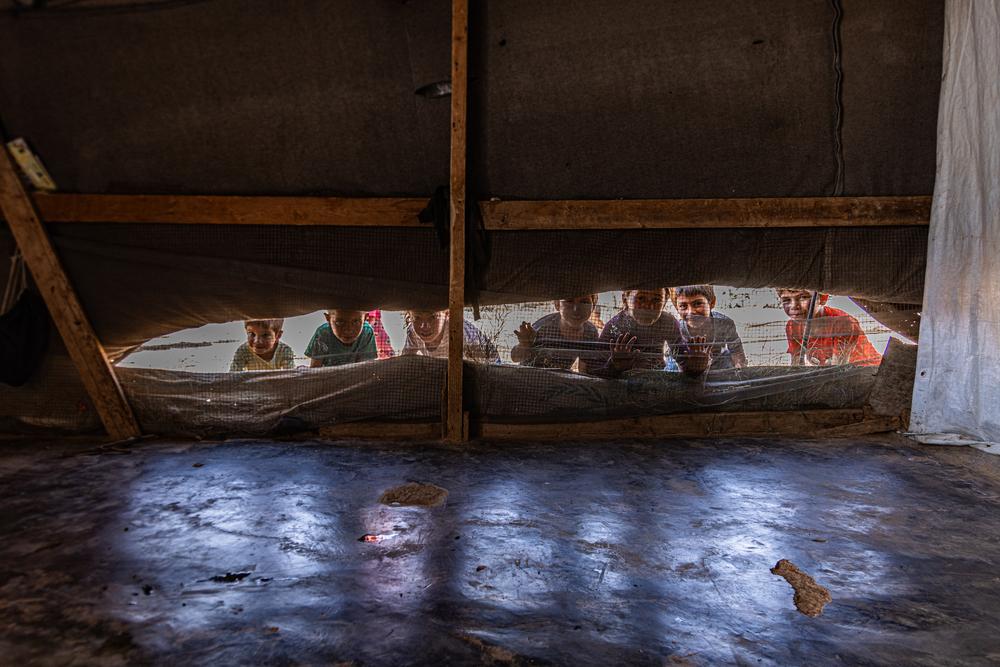
Syrian refugee children peak through the ventilation opening of a tent. Lebanon, June 2024. © Carmen Yahchouchi for MSF
- Syrian refugees seeking healthcare in Lebanon are facing increasing impediments accessing vital medical services due to growing fears and restrictions on their freedom of movement.
- Vulnerable communities’ access to healthcare should not be hindered by fear or intimidation. Patients should not have to choose between their safety and seeking medical help.
- The burden of anti-refugee rhetoric and the threat of evictions exact a significant toll on the mental health of Syrian patients.
“I wish for death,” says Umm Khattab, a Syrian refugee who has called a flimsy tent along the northeast border of Lebanon home for years. “We live in constant anxiety and terror. Death has become more merciful than living here."
Her words capture the stark reality faced by tens of thousands of refugees in Hermel, Qaa, and Arsal, Lebanon, where makeshift camps of tarps and scraps dot the arid landscape. These frail shelters offer little protection against the harsh elements and even less against the rising tide of anti-refugee sentiment in Lebanon. Refugees, crammed into inadequate spaces with dirt floors and no heating, grapple daily with the fear of security checkpoints and local tensions.
“Fear keeps my family of 10 crammed together in the tent all day,” says Wael, a 36-year-old father with hypertension and diabetes. “We never leave the tent after 6 p.m., as that is when the curfew on Syrians is imposed. The children never go out, and they face bullying from the local children.”
Wael has been a patient at the Doctors Without Borders / Médecins Sans Frontières (MSF) clinic in Hermel for a few years now, receiving vital medication for his chronic condition, but recent measures have made access to life-saving care increasingly difficult.
Since April, Lebanon has intensified raids and security measures to address the issue of unregistered individuals. As a result, Syrian patients seeking healthcare at Doctors Without Borders clinics in the Baalbek-Hermel governorate face growing impediments due to fears and restrictions on their freedom of movement. For many refugees in the governorate, the decision to seek medical help is now fraught with fear. One such example is Wael, who must cross a checkpoint to get to the Doctors Without Borders clinic in Hermel.
I always feel anxious when I have an appointment at the Doctors Without Borders clinic. I fear the security checkpoints. My appointment was on May 20th, but I was afraid to go out because of a security campaign in the area, so I decided not to go. The fear causes my blood sugar to rise, and I worry I won’t have the means to lower it.Wael, patient
During these security campaigns, Syrian nationals with expired papers are often captured at checkpoints and forcibly deported back to Syria, usually without the chance to contact their families in Lebanon.
Other patients with chronic disease have resorted to rationing or abandoning medication altogether out of fear of leaving their tent to get them. A few miles away in neighboring Qaa, Amer, another 36-year-old living with hypertension, had completely run out of his medication in April.
“I ran out of medicine and don’t have the means or courage to go for a refill,” Amer says. “I have nightmares of being chased by the authorities. I do not dare cross the checkpoint and be taken away from my family perhaps forever.”
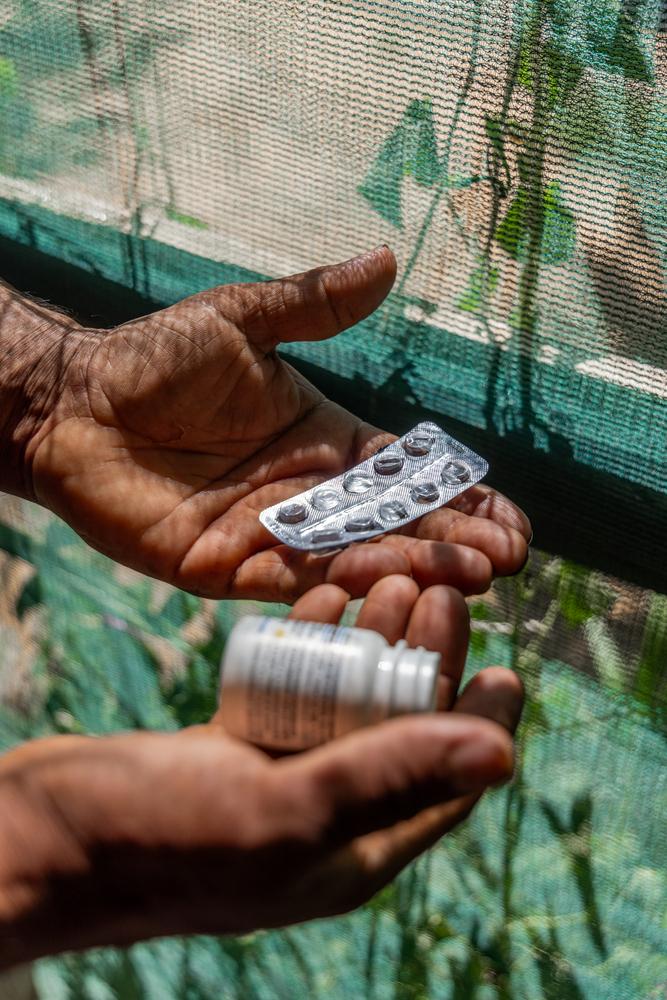
A 36-year-old Syrian refugee in Lebanon holds his empty hypertension medication. The country's economic crisis, coupled with recent security measures, have made accessing medication a nightmarish struggle for many non-communicable-disease patients. Lebanon, June 2024. © Carmen Yahchouchi for MSF
“I suffer from high blood pressure,” says 60-year-old Talal from the floor of his battered tent in Arsal. “I started taking medication two months ago because of rapid heartbeat, and my blood pressure regularly spikes above the normal range.”
The only way Talal was able to traverse the mountainous landscape of Arsal to get his medication was through a beatdown motorbike that recently got confiscated. A recent countrywide crackdown on unregistered vehicles in Lebanon has caused many Syrians to lose their motorcycles—which often serve as their only means for transportation after the economic crisis.
“It was our only means to take care of our needs,” he laments. “If I want to go buy food for my family or get my medical consultation and medication from your clinic, I will need to rent a motorbike or a "tuk-tuk" cart, which is cheaper than a car but still too expensive for us.”
Doctors Without Borders has been present in the Baalbek-Hermel governorate, in the northeast of the country, since 2010. For over a decade, Doctors Without Borders has been providing high-quality and free-of-charge medical services including pediatrics, sexual and reproductive healthcare, treatment for non-communicable diseases, vaccinations against preventable diseases, and mental health support for refugees and the local community alike.
Currently, Doctors Without Borders teams run a clinic in Arsal and another in Hermel, as well as supporting access to secondary healthcare through partner hospitals. Yet, even amidst this beacon of assistance, missed medical appointments soar as fear tightens its grip on the refugee community.
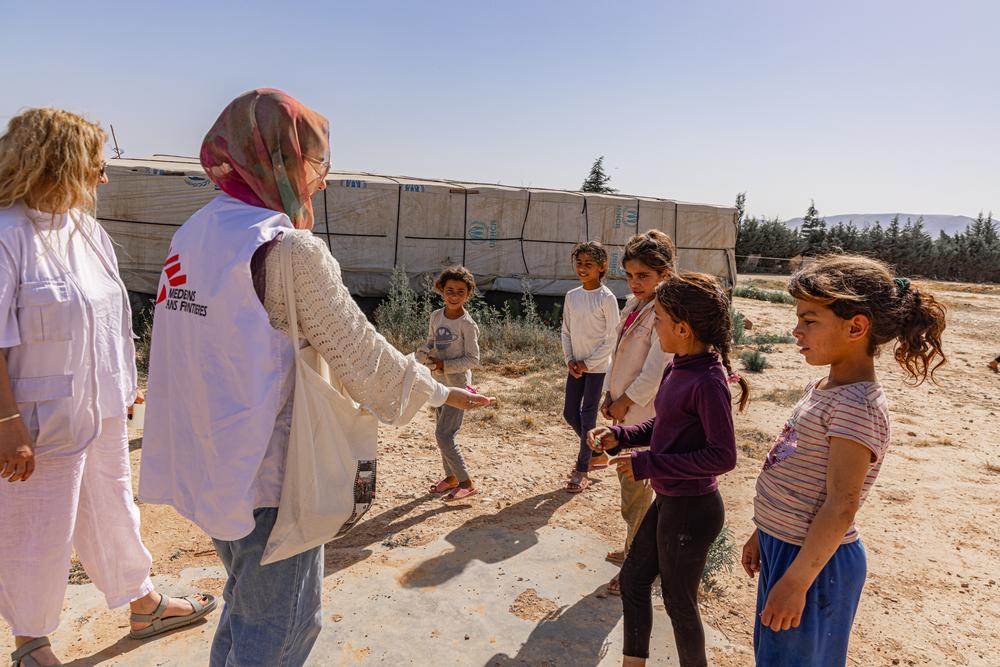
Doctors Without Borders teams are accompanied by children as they roam an informal tent settlement in Qaa, northeast Lebanon. The border town has witnessed a surge in anti-Syrian sentiment, impacting refugees' ability to access healthcare. Lebanon, June 2024. © Carmen Yahchouchi for MSF
Two tents down from Amer’s shelter lives Umm Omar, who underwent a home delivery less than a month ago. Umm Omar’s memory of the night her water broke unexpectedly is hazy, but she recalls clearly how the community’s fear of crossing army checkpoints kept her confined to the tent’s dirt floor, battling the pains of labor without anesthesia.
“I was screaming in the dead of night, and no one could take me to a clinic,” says Umm Omar as she swaddles her newborn. “They called for a fellow refugee here whose mother was a midwife. She thankfully delivered my baby by memory of the practice. But I still can’t leave the camp to get him a birth certificate.”
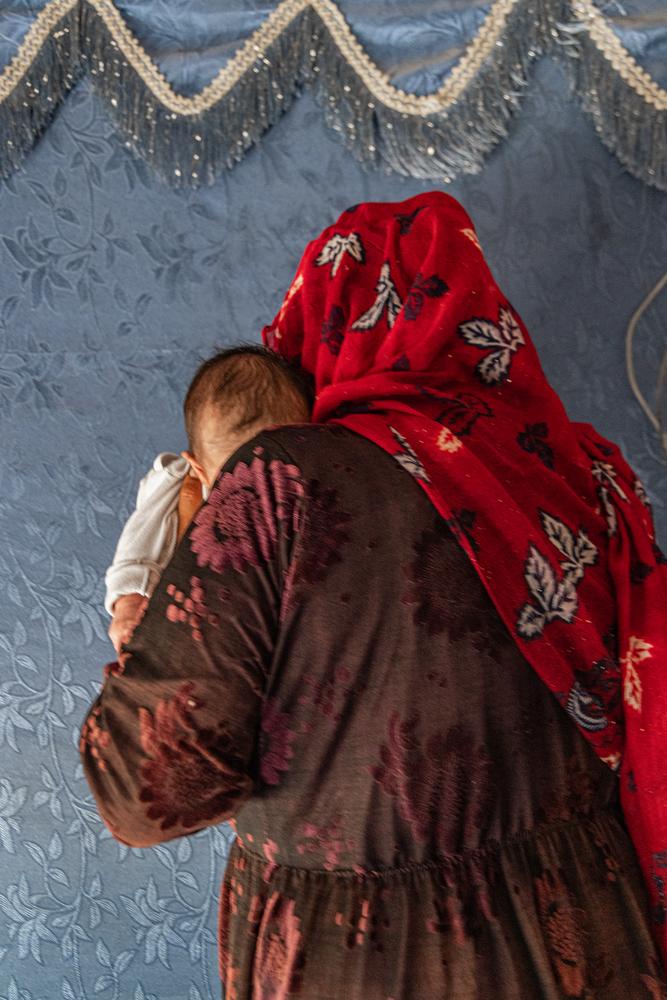
A Syrian refugee holds the month-old baby she helped deliver in Qaa, northeast Lebanon. Recent security measures and restrictions at checkpoints have impacted refugees' ability to access healthcare--forcing the community to come together for an impromptu delivery. Lebanon, June 2024. © Carmen Yahchouchi for MSF
Reflecting on their past, refugees often recount the perilous journey into Lebanon in similar words, fleeing devastation with little but the clothes on their backs and finding hope for survival in the hills of Lebanon.
Initially welcomed by the warmth of the host community, their sanctuary has since soured amidst Lebanon's economic meltdown. “At first, the municipality helped us when we came to Arsal,” says Maya, who has spent more of her life in Lebanon than in Syria. “They gave us some items to sit on and use. Then they enrolled me in school, and I started going to school. The community initially welcomed us and did not make us feel like strangers.”
However, as Lebanon strains under its fifth year of severe economic crisis, Syrian refugees face more intolerance in the country now. The economic hardship, compounded by fear of movement, has forced refugees into an impossible choice between their safety and their health. Even lower on the list of priorities for refugees at the moment is their mental health.
![Maya [name changed to preserve anonymity], a Syrian refugee in northeast Lebanon, holds a dove she tends to in her family's tent in Arsal.](/sites/default/files/styles/full_width/public/2024-07/MSB199212_Medium.jpg?itok=Ppzb8o11)
Maya [name changed to preserve identity], a Syrian refugee in northeast Lebanon, holds a dove she tends to in her family's tent in Arsal. A widow and a victim of child marriage, Maya has endured severe mental trauma, especially after the death of her daughters in a fire. Maya now looks for ways to heal herself and those around her through preaching communal care and mental health support. However, the recent anti-refugee sentiment in the region has made it difficult. Lebanon, June 2024. © Carmen Yahchouchi for MSF
"We live in constant anxiety and terror. I can't even sleep due to these security campaigns and my fear for my children,” says Umm Khattab, who has been suffering breakdowns since her son was deported in late 2023.
“Our children's hearts race with fear and anxiety during these campaigns, and we only hear the phrase, 'Here they come!' I try to comfort my children, but inside I am more afraid than they are."
"After several years of displacement, some Syrian refugees have developed further psychological symptoms," says Amani Al Mashaqba, Doctors Without Borders' mental health activity manager in Baalbek-Hermel.
High psychological distress is present in the refugees because of repeated crisis events. Changes in behavior related to exposure to traumatic events have been reported by our mental health patients in both adults and children.Amani Al Mashaqba, MH Activity Manager
“Their daily lives have been impacted and changed; nothing is like before. They go out less, have fewer relaxing moments, families are separated, and people have become not as open as they used to be. People are tired. They feel insecure, depressed, and down. Their youth are unsure how to cope with life—they cannot go back, but they also cannot move forward. They are stuck in a 'dead middle,' a state of perpetual limbo, that affects the entire family," Amani continues.
“Everyone is on edge,” Umm Khattab says, inadvertently describing the symptoms of post-traumatic episodes. “When we hear someone speaking loudly or a loud noise, we think a security raid has begun, and we panic.” Similar testimonies are shared by refugees in Arsal and Hermel.
The physical and mental toll on the refugee population is profound. “Our main hope is to live in safety and not be approached by the security forces. Fear is our primary suffering here," says another refugee.
"Believe me, if our place in Syria was safe, I wouldn't stay here for a minute. What will we do in Syria? We have nothing left there. Now we wish for death because death has become more merciful than living here,” says Umm Khattab.
The Syrian war, which began in 2011, led to widespread destruction and violence, displacing millions of people to the neighboring countries of Lebanon, Turkey, Jordan, Iraq and abroad. The ongoing instability has left Syria unsafe for many, making it challenging for many to return to their homeland. Syrian refugees seeking healthcare in northeastern Lebanon face increasing obstacles due to fears and restrictions on their movement. Vulnerable communities’ access to healthcare should not be hindered by fear or intimidation. Patients should not have to choose between their safety and seeking medical help.
“All I ask is for safety” —a plea that echoes the deep yearning for stability that defines the refugee experience for many in Lebanon today.
*Names in this article have been changed to protect anonymity.

